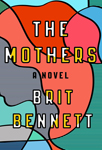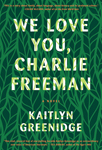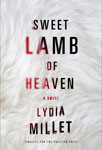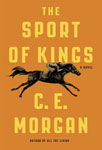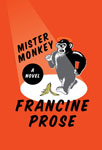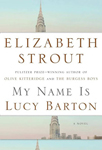by Charlie Jane Anders
Buy it at Powell’s »Steph Cha: Life, at least human life as we know it, is a one-shot game. This is a truth so patently horrible that it breeds endless religious and scientific workarounds; it’s something you just can’t think about all the time without going a little bit crazy. It means the world is unfair because things never even out. It means some people just suffer more than others, for no good reason, and with no compensation.
One of the nice things about fiction is that it keeps us away from that particular abyss as a side effect of the search for beauty and meaning. Also, sometimes, it’s straight-up about alternate realities accessible through rifts in the space time continuum.
But let’s talk about My Name Is Lucy Barton first—in case you were in suspense, Elizabeth Strout did not write the quantum theory novel. This is a book about one woman’s life, told through a series of vignettes scattered across time. It’s short—under 200 pages with an indulgent number of page breaks, essentially double-spaced with cheater margins—and the reading experience is dreamy and achy and utterly lovely in a way that reminded me of Dept. of Speculation, everyone’s favorite one-day read of 2014.
Lucy Barton is the protagonist, as you might have gathered from the title (see also Olive Kitteridge, The Burgess Boys, and Amy and Isabelle), a novelist raised in wretched poverty, reflecting on her past, her relationships, and her work from a position of relative success and stability. She lives in New York, having left Amgash, Ill., behind decades ago.
There are times now, and my life has changed so completely, that I think back on the early years and I find myself thinking: It was not that bad. Perhaps it was not. But there are times, too—unexpected—when walking down a sunny sidewalk, or watching the top of a tree bend in the wind, or seeing a November sky close down over the East River, I am suddenly filled with the knowledge of darkness so deep that a sound might escape from my mouth …
Most of the novel radiates out from a long hospital stay from “many years ago now,” when Lucy’s mother comes to see her after years of non-communication. Though almost every topic is fraught and scrupulously avoided (her childhood, her father, her husband, her departure from Amgash, her life in New York), Lucy is overwhelmed with happiness at seeing her mother, who passes the time by sharing gossip from back home, mostly about women who come to ruin through failed marriages.
So, you know, not the plottiest novel in the Tournament of Books, but it moves swiftly, and the writing is elegant and emotionally exact. You know when you listen to music, and a clear high note can make you cry? Strout kind of does that with words, using plain language in a way that is absolutely piercing. “All life amazes me,” says Lucy. It seems incredible to me that this sentence was never written before. (I googled it to check.)
Version Control is a different kind of book, less lyrical and less delicate, and less about novelists living in New York City. Dexter Palmer has a bigger canvas, and he fills it corner to corner with a flurry of characters, plotlines, and ideas—I scanned the back cover, and yup, there it is, a comparison to Pynchon.
The more apt comparison would be Neal Stephenson, if we’re playing that game, what with the science and the futurism and the general air of excited intelligence. Palmer also shares Stephenson’s penchant for geeky encyclopedic riffing—the novel is 500 pages long, and while it doesn’t feel bloated, it is certainly less efficient than My Name Is Lucy Barton.
To be fair, it’s also a lot more ambitious, tackling Big Data and quantum physics in addition to more mundane subjects like marriage and friendship. Like any good sci-fi/speculative fiction (let’s not torture ourselves trying to nail a label on this thing), Version Control uses science and technology to throw questions of humanity into high relief. Like so:
And yet Rebecca felt that it was hard to tell whether the secret algorithms of Big Data did not so much reveal you to yourself as they tried to dictate to you what you were to be. To accept that the machines knew you better than you knew yourself involved a kind of silent assent: you liked the things Big Data told you you were likely to like, and you loved the people it said you were likely to love. To believe entirely in the data entailed a slight diminishment of the self, small but crucial and, perhaps, irreversible.
(I read this while watching Westworld, incidentally, and they amplified each other in a way that was rather disorienting. “You don’t understand! You don’t understand. Rebecca. This world is a dream. This world is a house on fire, and all of us must find a way to escape.”)
The book takes place in near-future America, and Palmer’s extrapolations are relatively believable. There are self-driving cars, for instance, and the Dakotas are trying to secede from the Union. The main character, Rebecca Wright, is a woman in her thirties, living in New Jersey and working for Lovability, an online dating company with some questionable practices. Her husband, Philip Steiner, is a genius physicist working at a university lab, on a “causality violation device”—he gets very sensitive when anyone calls it a time machine. (He is, it’s worth noting, a much richer character than that description might suggest.) The device has yet to produce demonstrable results, but Rebecca has a strong feeling that “Nothing is as it should be; everything is upside down,” which may or may not have to do with her husband fucking around with space time in the background.
Still, she goes about her life, and we get full access to her day-to-day actions, her thoughts, and her memories. We see her marital troubles with Philip, her grief over their lost child, her alcoholism; we see their history, as well as her history with her girlfriends and family. I have to hand it to Palmer—he knows how to write female characters, and even more unusually, female friendships. There’s a whole chapter about Rebecca’s core group of girlfriends disbanding over time that I just can’t imagine many male novelists bothering to write and write well. For a while, it seemed like this might just be a book about one woman’s life in the near future, and I wasn’t not on board.
But I don’t think it gives too much away to say that the totally-not-a-time-machine device plays a significant role in the novel. After all, the title is a hard nod to the idea that there are multiple versions of reality and we may or may not be able to control them. The real pleasure is in seeing how this works in Palmer’s world, and I won’t spoil that fun for you.
This was a hard battle—I changed my mind several times before sealing the envelope. A character in My Name Is Lucy Barton says that “her job as a writer of fiction was to report on the human condition, to tell us who we are and what we think and what we do,” and both Strout and Palmer do this well. But only Palmer does it with wormholes and robot spiders, in a way that feels not only thoughtful but new and unreservedly fun. In the end, he got my vote for the sheer force of his creativity. I’m sure he knows just how easily it might have gone the other way.
Match Commentary
By Kevin Guilfoile & John Warner
John Warner: Well, a disappointment for me here. Maybe I’m an Elizabeth Strout fanboy, but I thought the slim little thing was devastating, different from Olive Kitteridge in style and density, but emotionally affecting. I read it while on jury duty, waiting to see if I’d be called to serve, and it managed to significantly reduce that particular misery. It reminded me of a competitor from last year, Kent Haruf’s Our Souls at Night, for its concision and the way it engages sentiment without becoming sentimental.
As Judge Cha points out, it’s interesting to see the parallels between the books, both considerations of the scope and impact of a particular life. (Or is it lives?) For me, Version Control suffered from a neither fish nor fowl problem. Save for maybe the last 20 percent it doesn’t have the pacing to really work as thriller/suspense. The quality of the prose is well above someone like Dan Brown, but it’s unremarkable at best. There’s a preoccupation with describing what’s eaten at every meal that is so prominent it must be important, but I couldn’t figure it out for the life of me.
The metaphysics and philosophizing is interesting enough, but not much past what stoned freshmen in dorm rooms have been blathering about for as long as there have been stoned freshmen.
The back jacket has a Publishers Weekly review that compares it to Joyce, Pynchon, and Gaddis, which seems kind of ridiculous. I’m aware that all of this is making me sound like a snob—I swear that I take deep pleasure in suspense and science fiction. I think I wanted this to be more true to those genres and push at the boundaries a bit less to make a more propulsive read, more in the tradition of Philip K. Dick than Thomas Pynchon.
Kevin Guilfoile: No doubt this is an upset. The omission of Olive Kitteridge from the ToB field in 2009 is perhaps the most persistent facepalm generator (among many) in Rooster history. For Strout to go out so early this time around is a shock.
But I will be a champion for Version Control.
This novel is structured oddly. The first 200 pages are basically a relationship novel with a few references to this thing that may or may not be a time machine. There are many discourses about friendship and alcoholism and loss (and notably, as you say, about food) and frustratingly little about killing Hitler or exterminating zombie parasites in time-distant dystopias.
The universe of Palmer’s novel is extremely familiar, only a few years and a few degrees off from our own. Palmer inserts some very occasional background discussion about a civil war brewing between North and South Dakota. No one in the novel seems the least bit concerned over these events, perhaps because the entire population of those two states is less than Ohio State University on parents weekend. These mentions are only there to remind us that the America of the novel—the version, I guess I should say—is different from ours, but not so much that you should feel alienated from the characters. They feel the way we do, react the way we might. I think Palmer’s world-building was very effective.
Still, I didn’t know what to make of it at first. I’ll even confess that I put it away after about 150 pages to read another novel or three before picking it up again. But as I got more and more comfortable in Palmer’s fictional space, I fell hard under its spell. As perplexed as I had been about the long tangents, I began to look forward to them. There is one about race, later in the book, that resisted the big-theme temptations inherent to writing science fiction. It was entirely peripheral to the story (except perhaps as an extension of the exploration of identity) but it was intense and personal and moving.
There was also a clever, extended allusion to the Bradbury short story “The Veldt,” which I found equally unnecessary but entirely charming.
In contrast to your take, I feel like the exploration of time travel was actually pretty fresh. There are familiar tropes here, for sure—there have to be—but the time-travelling plot, when it finally arrived, didn’t go where I expected it to.
If I were writing this novel, I would have constructed it very differently, to be sure. But that’s not a fair criticism. This is Palmer’s story and, meeting it on his terms, I loved it.
There is much more to discuss and unpack, particularly in those final 100 pages. Since Version Control will be back for another round, perhaps we should wait for another judge to weigh in before we venture too far into those weeds.
John: I think Version Control is an object lesson in how important it is to stick the landing in this type of novel. I agree about the slow start—if I wasn’t reading for the tournament I would’ve abandoned the book—but the expectation and promise that some kind of plot and story payoff is coming serves as a powerful incentive to keep going. My Name Is Lucy Barton has no similar drive. The bulk of the novel has Lucy in the hospital. We know she’s going to get better. There are revelations in her telling that give us a jolt, but not in the same way that a well-conceived, old-fashioned plot gets us involved.
As Cha says, it’s a particular kind of “fun,” and ultimately, it’s that aspect of the novel’s hybridized genre that makes it work—not enough for me to keep from lamenting My Name Is Lucy Barton’s demise, but I am not brokenhearted.
Kevin: Version Control is smart (and fun), and Palmer can write, but he can’t write sentences like Elizabeth Strout. Almost none of us can. That prose is clean, man. When I teach workshops I always say that writing fiction is a magic trick in which the author tries to make herself disappear. Strout isn’t even a puff of smoke on the stage. It’s a pleasure to read her, and there will be plenty of folks, like you, angered by My Name Is Lucy Barton’s exit. It will be interesting to see where that novel falls in the Zombie voting.
John: We’re back in the booth tomorrow for High Dive versus The Mothers, a historical novel of political intrigue against one of the year’s most exciting debuts. Journalist Susannah Cahalan will be in the judging hot seat.





